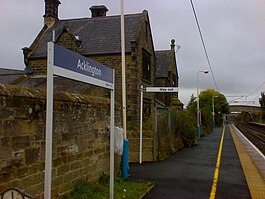Acklington railway station
| Acklington |
|
|---|---|
 |
|
| Location | |
| Place | Acklington |
| Local authority | County of Northumberland |
| Grid reference | NU222015 |
| Operations | |
| Station code | ACK |
| Managed by | Northern |
| Number of platforms | 2 |
| DfT category | F2 |
| Live arrivals/departures, station information and onward connections from National Rail Enquiries |
|
| Annual rail passenger usage* | |
| 2011/12 |
|
| 2012/13 |
|
| 2013/14 |
|
| 2014/15 |
|
| 2015/16 |
|
| National Rail – UK railway stations | |
| * Annual estimated passenger usage based on sales of tickets in stated financial year(s) which end or originate at Acklington from Office of Rail and Road statistics. Methodology may vary year on year. | |
|
|
|
Acklington railway station serves the village of Acklington in Northumberland, England.
The station is located on the East Coast Main Line 28 1⁄2 miles (46 km) north of Newcastle, although in the December 2016 timetable the only trains calling at Acklington are one northbound and two southbound local services operated on Mondays to Saturdays (and none on Sundays) by Northern, who also manage the station.
Opened by the York, Newcastle and Berwick Railway, then joining the North Eastern Railway, it became part of the London and North Eastern Railway during the Grouping of 1923. The line then passed on to the Eastern Region of British Railways on nationalisation in 1948.
When Sectorisation was introduced, the station was served by Regional Railways until the Privatisation of British Railways. Intercity Sector trains passed through on the East Coast Main Line.
The station has a substantial main building on the northbound side, which is Grade-II listed and now used as a private residence. It also had a goods yard and signal box. The station avoided the Beeching Axe in the late 1960s that claimed several others on the East Coast main line and until the late 1980s had through trains to Berwick-upon-Tweed and Edinburgh Waverley (though only 3-4 per day each way in total). Electrification of the ECML and a rolling stock shortage led to the timetable being cut to the present residual level in 1991.
...
Wikipedia
